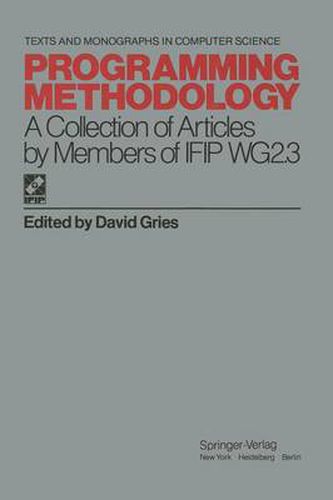Readings Newsletter
Become a Readings Member to make your shopping experience even easier.
Sign in or sign up for free!
You’re not far away from qualifying for FREE standard shipping within Australia
You’ve qualified for FREE standard shipping within Australia
The cart is loading…






This title is printed to order. This book may have been self-published. If so, we cannot guarantee the quality of the content. In the main most books will have gone through the editing process however some may not. We therefore suggest that you be aware of this before ordering this book. If in doubt check either the author or publisher’s details as we are unable to accept any returns unless they are faulty. Please contact us if you have any questions.
This volume is being published for two reasons. The first is to present a collection of previously published articles on the subject of programming methodology that have helped define the field and give it direction. It is hoped that the scientist in the field will find the volume useful as a reference, while the scientist in neighboring fields will find it useful in seriously acquainting himself with important ideas in programming methodology. The advanced student can also study it-either in a course or by himself -in order to learn significant material that may not appear in texts for some time. The second reason for this volume is to make public the nature and work on programming methodology of IFIP Working Group 2.3, hereafter called WG2.3. (IFIP stands for International Federation for Information Processing.) WG2.3 is one of many IFIP Working Groups that have been established to provide international forums for discussion of ideas in various areas. Generally, these groups publish proceedings of some of their meetings and occasionally they sponsor a larger conference that persons outside a group can attend. WG2.3 has been something of a maverick in this respect. From the beginning the group has shunned paperwork, reports, meetings, and the like. This has meant less pUblicity for IFIP and WG2.3, but on the other hand it has meant that meetings could be devoted almost wholly to scientific discussions.
$9.00 standard shipping within Australia
FREE standard shipping within Australia for orders over $100.00
Express & International shipping calculated at checkout
This title is printed to order. This book may have been self-published. If so, we cannot guarantee the quality of the content. In the main most books will have gone through the editing process however some may not. We therefore suggest that you be aware of this before ordering this book. If in doubt check either the author or publisher’s details as we are unable to accept any returns unless they are faulty. Please contact us if you have any questions.
This volume is being published for two reasons. The first is to present a collection of previously published articles on the subject of programming methodology that have helped define the field and give it direction. It is hoped that the scientist in the field will find the volume useful as a reference, while the scientist in neighboring fields will find it useful in seriously acquainting himself with important ideas in programming methodology. The advanced student can also study it-either in a course or by himself -in order to learn significant material that may not appear in texts for some time. The second reason for this volume is to make public the nature and work on programming methodology of IFIP Working Group 2.3, hereafter called WG2.3. (IFIP stands for International Federation for Information Processing.) WG2.3 is one of many IFIP Working Groups that have been established to provide international forums for discussion of ideas in various areas. Generally, these groups publish proceedings of some of their meetings and occasionally they sponsor a larger conference that persons outside a group can attend. WG2.3 has been something of a maverick in this respect. From the beginning the group has shunned paperwork, reports, meetings, and the like. This has meant less pUblicity for IFIP and WG2.3, but on the other hand it has meant that meetings could be devoted almost wholly to scientific discussions.